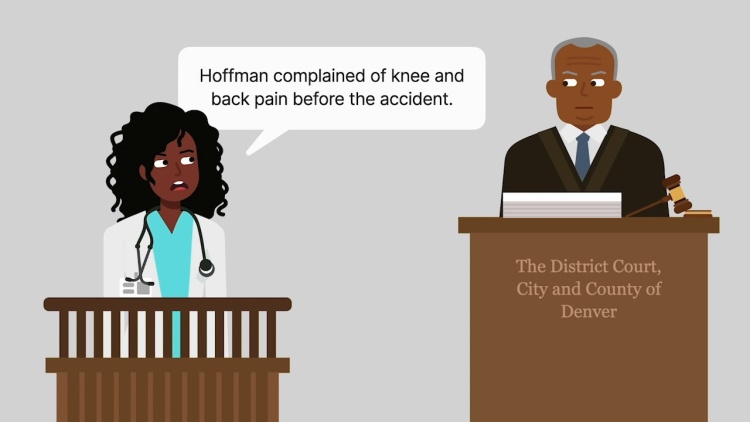Schafer v. Hoffman
Colorado Supreme Court
831 P.2d 897 (1992) (en banc)
- Written by Craig Conway, LLM
Facts
While driving his vehicle, an intoxicated Larry Schafer (defendant) struck a pedestrian, Shirley Hoffman (plaintiff), causing her to sustain serious injuries, including a compression fracture in a spinal vertebra, a concussion, a fractured femur, and other injuries to her knees and legs. Hoffman filed suit against Schafer, seeking to recover damages for her injuries. At trial, Schafer admitted to being negligent in the operation of his vehicle but argued that Hoffman had pre-existing medical conditions that precluded her from recovering monetary damages, or in the alternative, that any damages should be reduced. The jury heard expert medical testimony that Hoffman had seen a physician prior to the accident for pain in the same physical areas where she claimed she had been injured as a result of Schafer’s negligent conduct. At the close of the trial, the judge allowed Hoffman to submit a “thin skull” instruction that allowed the jury to award Hoffman damages without consideration of any physical frailties that may have made her more susceptible to injury. Schafer objected to the jury instruction and argued that there was no evidence of aggravation of Hoffman’s condition, and therefore, he should not be held liable for her pre-existing medical conditions. The jury held for Hoffman and awarded her $715,000 in damages. Schafer appealed. The court of appeals affirmed the decision of the trial court and held that the jury instruction was a proper statement of the law and supported by the evidence presented at trial. Schafer appealed. The Colorado Supreme Court granted certiorari to review.
Rule of Law
Issue
Holding and Reasoning (Vollack, J.)
What to do next…
Here's why 906,000 law students have relied on our case briefs:
- Written by law professors and practitioners, not other law students. 47,100 briefs, keyed to 995 casebooks. Top-notch customer support.
- The right amount of information, includes the facts, issues, rule of law, holding and reasoning, and any concurrences and dissents.
- Access in your classes, works on your mobile and tablet. Massive library of related video lessons and high quality multiple-choice questions.
- Easy to use, uniform format for every case brief. Written in plain English, not in legalese. Our briefs summarize and simplify; they don’t just repeat the court’s language.





